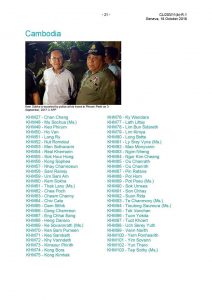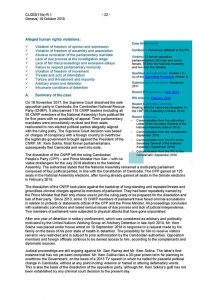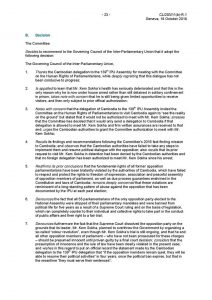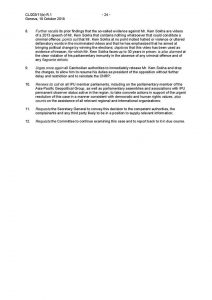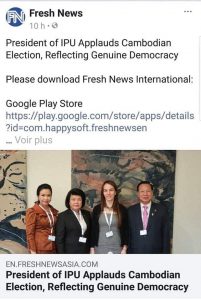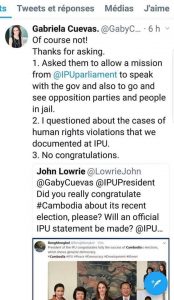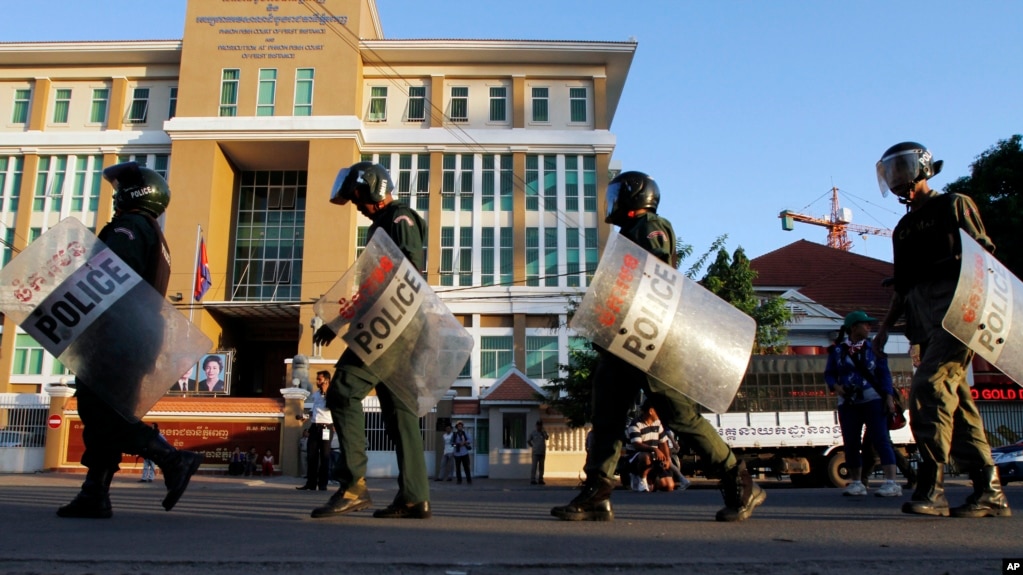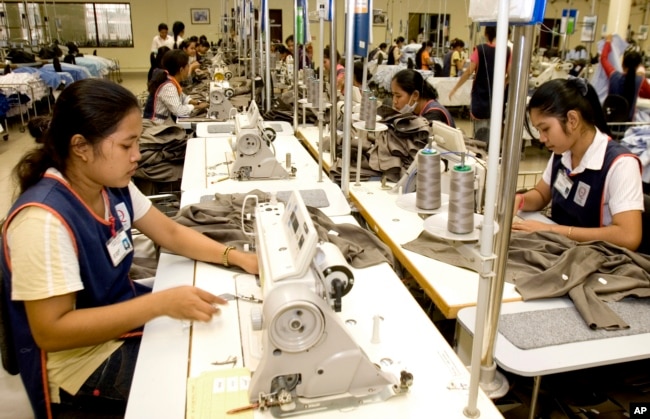Op-Ed: The CEROC
COMMITTEE FOR ELECTION RIGHTS OF OVERSEAS
CAMBODIANS (THE CEROC)
Email: board@khmeroversea.info, www.khmeroversea.info
សេចក្តីថ្លែងការណ៍
គំរប់ខួប២៧ឆ្នាំនៃកិច្ចព្រមព្រៀងសន្តិភាពទីក្រុងប៉ារីស
សូមគោរពបងប្អូនជនរួមជាតិទាំងអស់ជាទីស្នេហា!
១. របត់ថយក្រោយនៃកិច្ចព្រមព្រៀងសន្តិភាពទីក្រុងប៉ារីសក្នុងរយៈពេល២៧ឆ្នាំ
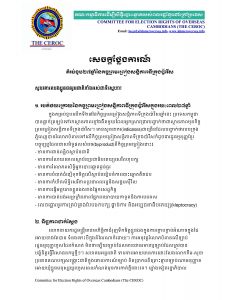 ក្នុងគម្រប់ខួបលើកទី២៧នៃកិច្ចព្រមព្រៀងសន្តិភាពទីក្រុងប៉ារីសឆ្នាំនេះ ប្រទេសកម្ពុជា បានធ្លាក់ត្រឡប់ទៅរកស្ថានភាពខ្មៅងងឹតមួយដែលអ្នកស្រាវជ្រាវបញ្ជាក់ថាជាស្ថានភាពមុនកិច្ចព្រមព្រៀងសន្តិភាពទីក្រុងប៉ារីស។ មានសូចនាករ(indicators)ជាច្រើនដែលបញ្ជាក់ថារបបក្រុង ភ្នំពេញបានរំលោភបំពានទៅលើកិច្ចព្រមព្រៀងសន្តិភាពទីក្រុងប៉ារីសក៏ដូចជារដ្ឋធម្មនុញ្ញខ្មែរ បច្ចុប្បន្នដែលជាសមិទ្ធផលសំរេច(byproduct)ពីកិច្ចព្រមព្រៀងនោះ៖
ក្នុងគម្រប់ខួបលើកទី២៧នៃកិច្ចព្រមព្រៀងសន្តិភាពទីក្រុងប៉ារីសឆ្នាំនេះ ប្រទេសកម្ពុជា បានធ្លាក់ត្រឡប់ទៅរកស្ថានភាពខ្មៅងងឹតមួយដែលអ្នកស្រាវជ្រាវបញ្ជាក់ថាជាស្ថានភាពមុនកិច្ចព្រមព្រៀងសន្តិភាពទីក្រុងប៉ារីស។ មានសូចនាករ(indicators)ជាច្រើនដែលបញ្ជាក់ថារបបក្រុង ភ្នំពេញបានរំលោភបំពានទៅលើកិច្ចព្រមព្រៀងសន្តិភាពទីក្រុងប៉ារីសក៏ដូចជារដ្ឋធម្មនុញ្ញខ្មែរ បច្ចុប្បន្នដែលជាសមិទ្ធផលសំរេច(byproduct)ពីកិច្ចព្រមព្រៀងនោះ៖
- មានការជាន់ពន្លិចស្ថាប័នជាតិ
-
មានការរំលាយចោលស្ថាប័នប្រជាធិបតេយ្យសេរីពហុបក្ស
-
មានការរំលោភពសិទ្ធិអ្នកបោះឆ្នោតឆ្ងន់ធ្ងរ
-
មានការបំបាត់ជំនឿទុកចិត្តលើស្ថាប័នរៀបចំការបោះឆ្នោតគឺគជប
-
មានការកំហិតសិទ្ធិសេរីភាពប្រជាពលរដ្ឋនិងសង្គមស៊ីវិល
-
មានការធ្វើអត្តឃាតខ្លួនឯងខាងផ្នែកសេដ្ឋកិច្ច
-
មានការបាត់បង់អព្យាក្រិតភាពផ្នែកនយោបាយកាទូតនិងការបរទេស
-
លេចធ្លោរនូវការគ្រប់គ្រងបែបឯកបក្ស ផ្តាច់ការ និងអប្បជនាធិបតេយ្យ(kleptocracy)
២. ទិដ្ឋភាពជាក់ស្តែង
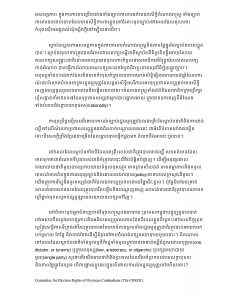 លោកនាយករដ្ឋមន្ត្រីមានមហិច្ឆិតាជំរុញទឹកចិត្តខ្លួនឯងក្នុងការក្តោបក្តាប់អំណាចក្នុងដៃអោយខាងតែបាន ទំនងទោះបីក្នុងតំលៃណាក៏ដោយ។ ការអនុវត្តរំលោភបំពានលើច្បាប់ រដ្ឋធម្មនុញ្ញហួសដែនកំណត់ មិនថាឡើយច្បាប់ដែលមានជាធរមានឬច្បាប់ដែលត្រូវបាន បង្ខំចិត្តធ្វើវិសោធនកម្មថ្មីៗ។ សហគមអន្តរជាតិ ទាមទារអោយមានការដោះលែងលោកកឹម-សុខា ប្រធានគណបក្សសង្គ្រោះជាតិក្នុងគោលការណ៍ច្បាប់ ពិតប្រាកដពីព្រោះគ្មានច្បាប់ណាអនុញ្ញាត អោយឃុំខ្លួនមនុស្សយូរហួសពេលកំណត់មុនការកាត់ក្តីនោះទេ។ ម្យ៉ាងទៀតរដ្ឋាភិបាល អសមត្ថភាព ក្នុងការការពារច្រើនយ៉ាងទាំងច្បាប់ការពារអភ័យឯកសិទ្ធិតំណាងរាស្ត្រ ទាំងច្បាប់ ការពារជនជាប់ចោទដែលមានសិទ្ធិការពារខ្លួននៅចំពោះមុខច្បាប់នៅពេលដែលតុលាការ កំពុងស៊ើបអង្កេតសំណុំរឿងក្តីនៅឡើយជាដើម។
លោកនាយករដ្ឋមន្ត្រីមានមហិច្ឆិតាជំរុញទឹកចិត្តខ្លួនឯងក្នុងការក្តោបក្តាប់អំណាចក្នុងដៃអោយខាងតែបាន ទំនងទោះបីក្នុងតំលៃណាក៏ដោយ។ ការអនុវត្តរំលោភបំពានលើច្បាប់ រដ្ឋធម្មនុញ្ញហួសដែនកំណត់ មិនថាឡើយច្បាប់ដែលមានជាធរមានឬច្បាប់ដែលត្រូវបាន បង្ខំចិត្តធ្វើវិសោធនកម្មថ្មីៗ។ សហគមអន្តរជាតិ ទាមទារអោយមានការដោះលែងលោកកឹម-សុខា ប្រធានគណបក្សសង្គ្រោះជាតិក្នុងគោលការណ៍ច្បាប់ ពិតប្រាកដពីព្រោះគ្មានច្បាប់ណាអនុញ្ញាត អោយឃុំខ្លួនមនុស្សយូរហួសពេលកំណត់មុនការកាត់ក្តីនោះទេ។ ម្យ៉ាងទៀតរដ្ឋាភិបាល អសមត្ថភាព ក្នុងការការពារច្រើនយ៉ាងទាំងច្បាប់ការពារអភ័យឯកសិទ្ធិតំណាងរាស្ត្រ ទាំងច្បាប់ ការពារជនជាប់ចោទដែលមានសិទ្ធិការពារខ្លួននៅចំពោះមុខច្បាប់នៅពេលដែលតុលាការ កំពុងស៊ើបអង្កេតសំណុំរឿងក្តីនៅឡើយជាដើម។
ស្ថាប័នរដ្ឋសភាអសមត្ថភាពក្នុងការការពារតំណាងរាស្ត្រនិងភាពថ្លៃថ្នូរនៃស្ថាប័នរបស់ខ្លួនបាន។ ស្ថាប័នតុលាការត្រូវបានគំរាមដោយពាក្យបណ្តឹងពីស្ថាប័ននីតិប្រតិបត្តិអោយរំលាយ គណបក្សសង្គ្រោះជាតិដោយមានប្រធានតុលាការកំពូលជាសមាជិកអចិន្ត្រៃយ៍របស់គណបក្ស កាន់អំណាច បានធ្វើការរំលាយគណបក្សនេះឆកល្វែងនិងខ្វះខាតសុភវិនិច្ឆ័យផ្លូវច្បាប់។ មនុស្សទាំង១១៨នាក់ដែលមិនមានកំហុសក៏ត្រូវបានហាមឃាត់សិទ្ធិធ្វើនយោបាយ៥ឆ្នាំដែលការណ៍នេះរំលោភបំពានមាត្រារដ្ឋធម្មនុញ្ញដែលផ្តល់សិទ្ធិសេរីភាពអោយប្រជាពលរដ្ឋគ្រប់មានសិទ្ធិ ពេញលេញចូលរួមនយោបាយនិងធ្វើនយោបាយ។តំណាងរាស្ត្រទាំង៥៥និងសមាជិកក្រុមប្រឹក្សាឃុំសង្កាត់ទាំង៥០០៧ដែលប្រជាពលរដ្ឋជាអ្នកបោះឆ្នោតអោយ ត្រូវបានដកចេញពីតំណែង ទាំងបំពាននិងគ្មានហេតុផល(irrationality)។
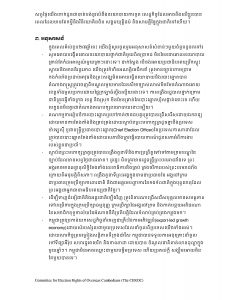 ការប្រព្រឹត្តល្មើសលើគោលការណ៍ច្បាប់រដ្ឋធម្មនុញ្ញដែលជាគ្រឹះនៃស្ថាប័នជាតិនិងការជាន់ ឈ្លីទៅលើសំលេងប្រជាពលរដ្ឋខ្លួនឯងជិតពាក់កណ្តាលនគរនេះ ជាអំពើបំពានយ៉ាងគឃ្លើន ទោះបីសេចក្តីប្រឹងប្រែងជាច្រើនដែលធ្លាប់បានធ្វើកន្លងមក ពិបាកនឹងអាចប៉ៈប៉ូវបាន។
ការប្រព្រឹត្តល្មើសលើគោលការណ៍ច្បាប់រដ្ឋធម្មនុញ្ញដែលជាគ្រឹះនៃស្ថាប័នជាតិនិងការជាន់ ឈ្លីទៅលើសំលេងប្រជាពលរដ្ឋខ្លួនឯងជិតពាក់កណ្តាលនគរនេះ ជាអំពើបំពានយ៉ាងគឃ្លើន ទោះបីសេចក្តីប្រឹងប្រែងជាច្រើនដែលធ្លាប់បានធ្វើកន្លងមក ពិបាកនឹងអាចប៉ៈប៉ូវបាន។
នៅពេលដែលស្ថាប័នទាំងបីដែលជាគ្រឹះរបស់ជាតិត្រូវបានជាន់ឈ្លឺ សារពត៌មានដែល ចាត់ទុកថាជាអំណាចទីបួនរបស់ជាតិក៏ត្រូវបានរុះរើនិងបំផ្លិចបំផ្លាញ។ ដើម្បីអនុវត្តគោល នយោបាយជាតិមួយបានប្រកបដោយទំនួលខុសត្រូវ មានក្រមសីលធម៌ មានតម្លាភាពនិងទទួល បានពត៌មានពិតក្នុងការអនុវត្តច្បាប់និងគោលនយោបាយ(policy)នានារបស់ក្រសួងនីមួយៗ យើងត្រូវការវិទ្យុនិងទូរទស្សន៍ជាតិដែលឯករាជ្យប្រកបដោយវិជ្ជាជីវៈខ្ពស់។ ប៉ុន្តែមិនមែនគ្រាន់ សារពត៌មានឯកជនទេដែលត្រូវបានរឹតបន្តឹងនិងបណ្តេញចេញ សារពត៌មានជាតិត្រូវបានយកមក ប្រើផ្តាច់មុខសម្រាប់ផ្សព្វផ្សាយនយោបាយបក្សទៅវិញ។
នៅចំពោះមុខអ្នកជំនាញខាងវិទ្យាសាស្ត្រនយោបាយ ប្រទេសកម្ពុជាបច្ចុប្បន្នបានបាត់ បង់អស់ហើយនូវឯករាជ្យភាពនិងអធិបតេយ្យបូរណភាពដែនដីរបស់ខ្លួនពីព្រោះនៅពេលកិច្ចព្រម ព្រៀងសន្តិភាពទីក្រុងប៉ារីសត្រូវបានគេរំលោភបំពានព្រមទាំងរដ្ឋធម្មនុញ្ញជាតិត្រូវបានគេយកមក បកស្រាយ កែច្នៃ និងចាត់ចែងដើម្បីតំរូវទៅតាមចំណង់បក្សនយោបាយមួយនោះ។ ពិតណាស់ នៅពេលដែលស្ថាប័នជាតិទាំងមូលឬនីតិរដ្ឋទាំងមូលត្រូវបានគេជាន់ឈ្លឺជំនួសដោយបុគ្គល(one, dictator, or tyranny) ឬក្រុមមនុស្ស(few, aristocracy, or oligarchy) ឬបក្សនយោបាយ មួយ(single party) សួរថាតើយើងមានជាតិនិងប្រទេសដែលរឹងមាំប្រកបដោយសក្តានុពល និងភាពថ្លៃថ្នូរដែរឬទេ បើការផ្លាស់ប្តូរនេះផ្ទុយពីគោលការណ៍រដ្ឋធម្មនុញ្ញទៅហើយនោះ? សព្វថ្ងៃយើងហាក់ដូចជាបាត់បង់នូវលំនឹងនយោបាយការទូត សេដ្ឋកិច្ចដែលអាចពឹងលើខ្លួនបាន ពេលដែលមានតែកម្ចីនិងវិនិយោគិនចិន សង្គមយុត្តិធម៌ និងសាមគ្គីផ្ទៃក្នុងជាតិទៅហើយ។
៣. អនុសាសន៍
ក្នុងពេលគំរប់ខួប២៧ឆ្នាំនេះ យើងខ្ញុំសូមចូលរួមអនុសាសន៍សំខាន់ៗមួយចំនួនដូចតទៅ៖
- សូមអោយបង្កើតគោលនយោបាយថ្នាក់ជាតិមួយពិតប្រាកដ មិនមែនជាគោលនយោបាយ គ្រាន់តែកំដរអារម្មណ៍មួយគ្រាៗនោះទេ។ ជាក់ស្តែង បើចង់អោយប្រជាធិបតេយ្យរីកស្គុះ ស្គាយនិងមាននិរន្តរភាព យើងត្រូវកំហិតអណត្តិមេដឹកនាំ ត្រូវមានច្បាប់ហាមប្រាម កងកំលាំងប្រដាប់អាវុធនិងព្រះសង្ឃមិនអោយធ្វើនយោបាយនិងបោះឆ្នោតបាន តំណាងរាស្ត្រត្រូវចេញពីមណ្ឌលមួយមានដែនសីមាច្បាស់លាស់មិនមែនតំណាងអោយ ខេត្តទាំងមូលប្រកបដោយផ្ទៃក្រឡាធំល្វឹងល្វើយនោះទេ។ ការពង្រឹងរដ្ឋបាលថ្នាក់ក្រោម ជាតិត្រូវធ្វើទាំងក្រុង ខេត្ត និងស្រុក មិនមែនគ្រាន់តែបោះឆ្នោតឃុំសង្កាត់នោះទេ ហើយ បេក្ខជនមិនគួរជាតំណាងគណបក្សនយោបាយនោះឡើយ។
- គណកម្មការរៀបចំការបោះឆ្នោតឬហៅកាត់ថាគជបគួរត្រូវបានជ្រើសរើសដោយឯករាជ្យដោយមានការតែងតាំងនិងគ្រប់គ្រងដោយស្ថាប័នព្រះមហាក្សត្រដូចគ្នានឹងប្រទេស ម៉ាឡេស៊ី ឬជាមន្ត្រីប្រធានបោះឆ្នោត(Chief Election Officer)នៃប្រទេសកាណាដាដែល ត្រូវបានបោះឆ្នោតតែងតាំងដោយសភានិងត្រូវធ្វើរបាយការណ៍ជូនសភាអំពីការងារ របស់ខ្លួនជាប្រចាំ។
- ស្ថាប័នព្រះមហាក្សត្រគួរត្រូវបានពង្រឹងតួនាទីនិងការប្រព្រឹត្តទៅទៅតាមក្រមខណ្ឌនៃ ច្បាប់ដែលមានសព្វថ្ងៃជាធរមាន។ ដូច្នេះ មិនត្រូវមានរដ្ឋមន្ត្រីព្រះបរមរាជវាំងទេ ព្រះ អង្គអាចមានឆន្ទានុសិទ្ធិតែងតាំងលេខាធិការនិងគ្រប់ គ្រងថវិការរបស់ព្រះបរមរាជវាំង ក្រោយពីអនុមត្តិពីសភា។ ពង្រឹងតួនាទីព្រះអង្គក្នុងនាមជាប្រធាននៃ អង្គចៅក្រម ជាប្រធានក្រុមប្រឹក្សាការពារជាតិ និងជាអគ្គមេបញ្ជាការនៃកងទ័ពជាតិក្នុងបុព្វហេតុដែល ព្រះអង្គជាអ្នកធានាអធិបតេយ្យជាតិខ្មែរ។
- ដើម្បីទាញជំនឿជាតិនិងអន្តរជាតិឡើងវិញ ត្រូវពិចារណាជ្រើសរើសបុគ្គលមានសមត្ថភាព ទៅបម្រើការក្នុងក្រុមប្រឹក្សាធម្មនុញ្ញ ក្រុមប្រឹក្សានៃអង្គចៅក្រម និងកាត់បន្ថយអតិផរណា នៃសមាជិកខុទ្ទកាល័យនៃអំណាចនីតិប្រតិបត្តិដែលទំលាប់គ្រប់គ្រងកន្លងមក។
- កម្ពុជាត្រូវប្រកាន់យកសេដ្ឋកិច្ចនាំចេញជាគ្រឹះនៃការអភិវឌ្ឍន៍(export-led growth economy)ដោយសំរបសំរួលជាមួយប្រទេសដែលនំាចូលពីប្រទេសយើងទាំងអស់។ ដោយសារកិច្ចព្រមព្រៀងសន្តិភាពទីក្រុងប៉ារីស កម្ពុជាបានទទួលការអនុគ្រោះនំាចូល ទៅទីផ្សាអឺរ៉ុប សហរដ្ឋអាមេរិក និងកាណាដា ដោយបាន ចំណូលជាតិពាន់លានដុល្លាក្នុង មួយឆ្នាំៗ។ កម្ពុជាមិនអាចឈ្លោះជាមួយបច្ចឹមប្រទេស ហើយប្រគល់ក្តី សង្ឃឹមអោយចិន តែមួយបានទេ។
៤. ដំណោះស្រាយបន្ទាន់ចំពោះមុខ
ដើម្បីស្តារស្ថានការណ៍ចំពោះមុខនាពេលបច្ចុប្បន្ន កម្ពុជាត្រូវអនុវត្តន៍តាមអនុសាសន៍ របស់សហគមអឺរ៉ុបជាកំហិត បើមិនដូច្នោះទេEBA ឬកូតាអនុគ្រោះពន្ធពិសេសនេះ នឹង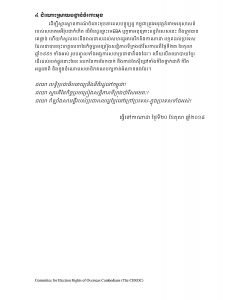 ត្រូវបាន គេផ្តាច់ ហើយកំសួលនេះនឹងរាលដាលដល់សហរដ្ឋអាមេរិកនិងកាណាដា រហូតដល់ប្រទេស ដែលជាបានចុះហត្ថលេខានៃកិច្ចព្រមព្រៀងសន្តិភាពទីក្រុងប៉ារីសកាលពីថ្ងៃទី២៣ ខែតុលា ឆ្នាំ១៩៩១ ទាំងអស់ រួមបញ្ចូលទាំងអង្គការសហប្រជាជាតិផងដែរ។ ហើយបើនយោបាយខ្មែរ ដើរដល់របត់ផ្លូវនោះមែន រលកនៃការបែកបាក់ នឹងកាន់តែស៊ីជ្រៅទាំងកំរិតថ្នាក់ជាតិ កំរិត អន្តរជាតិ និងក្នុងចំណោមសមាជិកគណបក្សកាន់អំណាចផងដែរ។
ត្រូវបាន គេផ្តាច់ ហើយកំសួលនេះនឹងរាលដាលដល់សហរដ្ឋអាមេរិកនិងកាណាដា រហូតដល់ប្រទេស ដែលជាបានចុះហត្ថលេខានៃកិច្ចព្រមព្រៀងសន្តិភាពទីក្រុងប៉ារីសកាលពីថ្ងៃទី២៣ ខែតុលា ឆ្នាំ១៩៩១ ទាំងអស់ រួមបញ្ចូលទាំងអង្គការសហប្រជាជាតិផងដែរ។ ហើយបើនយោបាយខ្មែរ ដើរដល់របត់ផ្លូវនោះមែន រលកនៃការបែកបាក់ នឹងកាន់តែស៊ីជ្រៅទាំងកំរិតថ្នាក់ជាតិ កំរិត អន្តរជាតិ និងក្នុងចំណោមសមាជិកគណបក្សកាន់អំណាចផងដែរ។
ជយោ លទ្ធិប្រជាធិបតេយ្យនិងនីតិរដ្ឋនៅកម្ពុជា!
ជយោ ស្មារតីនៃកិច្ចព្រមព្រៀងសន្តិភាពទីក្រុងប៉ារីសអមតៈ!
ជយោ កំឡាំងសាមគ្គីរបស់ប្រជាពលរដ្ឋខ្មែរនៅក្រៅប្រទេស-ក្នុងប្រទេសទាំងអស់!
ធ្វើនៅកាណាដា ថ្ងៃទី២០ ខែតុលា ឆ្នាំ២០១៨
Public Statement on the Paris Peace Agreement 23 October 2018

